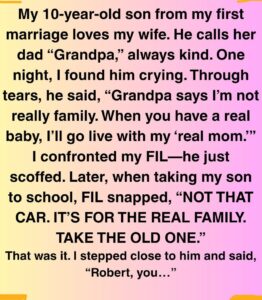My Stepfather Claimed My Son Wasn’t Family—He Regretted That Decision

My son from my previous marriage is 10. He’s bright, warm, and he absolutely adores my wife’s father, calling him “Grandpa” without hesitation. But one night, I found him quietly sobbing. Through choked-up words, he told me that “Grandpa said I don’t count as family. He said when you have a real kid, I’ll have to go live with my mom.”
I was stunned. Furious. But when I confronted my father-in-law, Robert, he shrugged it off. Later that week, while I was getting ready to take my son to school, Robert snapped, “Not that car. That’s for the real family. Take the old one.” I got close to him and said firmly, “Robert, you’re crossing a line you can’t come back from.” He scoffed and waved me off like I was being dramatic.
I held it together until I dropped my son off. He kept glancing at me, like he needed reassurance that he still mattered. No 10-year-old should ever have to ask that question with his eyes.
That night, I told my wife, Sylvie, what had happened. Her face fell. She promised to talk to her father, but the next morning she looked defeated—he had dismissed the whole thing as “a joke.” I couldn’t believe it. What kind of joke sends a child to bed in tears?
I reached out to a lawyer friend to see if there were legal ways to protect my son in our own home. His answer was blunt: “Either you and your wife enforce boundaries, or you remove yourselves from the situation.”
Leaving felt like quitting on my son. But doing nothing felt worse. That night, I told Sylvie I wanted her father out of our house until he could treat my son with decency. She was heartbroken and defensive. “He’s my father,” she said.
“And he’s hurting my son,” I replied. “We have to choose safety.”
The next few days were tense. Robert doubled down on his cruelty. He told my son, “Your dad shouldn’t waste all his money on you before the real baby comes.” That night, my son asked if I’d still love him when we had a baby.
I hugged him like I could hold the pain away. “You will always be my son. Nothing will change that.”
Eventually, Sylvie agreed—her father had to leave. We told him together. He turned red, called me names, and stormed out with his suitcase.
For a while, things were calm. My son was his cheerful self again. But then Robert showed up one Sunday, holding a box of cookies. My son smiled, thinking he was finally being accepted. But Robert pulled me aside and whispered, “I’m not here to apologize. Just reminding you—you’ll never be part of this family.”
I didn’t yell. I just said, “If you can’t respect my son, you don’t belong here.”
He smirked. “This is Sylvie’s house.”
She heard that from the kitchen. She stepped out and said, “Actually, it’s our house. And you’re a guest.”
He left, stunned.
Soon after, Sylvie and I learned we were expecting. We kept it quiet, afraid of how Robert might react. Our worst fears came true when he blurted out a cruel remark at a family dinner: “Let’s hope this one knows how to behave—unlike the first attempt.”
My son’s face crumpled. I stood up and led Robert outside.
“You’ve said enough,” I told him. “If you can’t love both kids, you’ll be part of neither of their lives.”
He laughed, “That’s not how families work.”
Sylvie followed me out, cradling our baby bump. “Then you’ll have to learn,” she told him.
That was the turning point. Sylvie started therapy. She began seeing her dad’s behavior for what it was—controlling, cruel, and deeply damaging. She asked him to join her in therapy. He refused.
We stopped engaging with him. We focused on our growing family.
When our daughter, Elodie, was born, we didn’t tell him. We soaked in our joy. My son was the best big brother—gentle, helpful, and proud.
Then Robert showed up at our door. “I want to meet my granddaughter,” he demanded.
I stepped outside and closed the door behind me. “When you’re ready to be a grandfather to both of them, we’ll talk. Not before.”
He scoffed. “Sylvie will fold.”
She didn’t. She came out with Elodie in her arms and said, “If you can’t love both my children, you won’t be seeing either one.”
He looked like he’d been slapped.
He tried calling daily, but Sylvie stayed firm. Eventually, he stopped.
Months later, on Elodie’s first birthday, Robert called again. His voice was tired. He asked to come talk.
He showed up looking frail. As soon as he walked in, he began to cry. He apologized—really apologized. To my son, to Sylvie, to me. He admitted he was afraid of being replaced, that he took it out on a child who only wanted to belong.
My son looked to me. I nodded. He gave Robert a hug.
It wasn’t instant forgiveness. But it was a beginning.
Over the next year, Robert changed. He came to therapy. He spent time with my son—just the two of them. Trust began to rebuild.
One evening, he stayed behind after a family dinner. Quietly, he said to me, “I was wrong about you. You’re a better father than I ever managed to be.”
I didn’t need to say anything. I just nodded.
Because this wasn’t about winning. It was about breaking a cycle before it broke another generation.